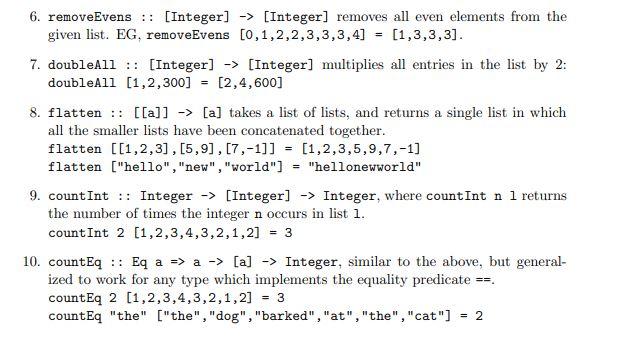Answered step by step
Verified Expert Solution
Question
1 Approved Answer
Using Haskell Identify the base case, and what the function should return in that case. In the recursive case, identify how knowing the result of

Using Haskell
Identify the base case, and what the function should return in that case. In the recursive case, identify how knowing the result of calling the function recursively on the tail of the list will enable you to compute the answer for the entire list.
6. removeEvens :: [Integer] -> [Integer] removes all even elements from the given list. EG, removeEvens [0,1,2,2,3,3,3,4] [1,3,3,3]. 7. doubleAll :: [Integer] -> [Integer] multiplies all entries in the list by 2: doubleAll (1,2,300] = [2,4,600] 8. flatten :: [[a]] -> [a] takes a list of lists, and returns a single list in which all the smaller lists have been concatenated together. flatten [[1,2,3] , [5,9] , [7,-1]] = [1,2,3,5,9,7,-1] flatten ("hello", "new","world"] = "hellonewworld" 9. countInt :: Integer -> [Integer] -> Integer, where countInt n 1 returns the number of times the integer n occurs in list 1. countInt 2 (1,2,3,4,3,2,1,2] 10. countEq :: Eq a => a => [a] -> Integer, similar to the above, but general- ized to work for any type which implements the equality predicate countEq 2 (1,2,3,4,3,2,1,2] = 3 countEq "the" ["the", "dog", "barked","at","the", "cat"] = 2 = 3 == 6. removeEvens :: [Integer] -> [Integer] removes all even elements from the given list. EG, removeEvens [0,1,2,2,3,3,3,4] [1,3,3,3]. 7. doubleAll :: [Integer] -> [Integer] multiplies all entries in the list by 2: doubleAll (1,2,300] = [2,4,600] 8. flatten :: [[a]] -> [a] takes a list of lists, and returns a single list in which all the smaller lists have been concatenated together. flatten [[1,2,3] , [5,9] , [7,-1]] = [1,2,3,5,9,7,-1] flatten ("hello", "new","world"] = "hellonewworld" 9. countInt :: Integer -> [Integer] -> Integer, where countInt n 1 returns the number of times the integer n occurs in list 1. countInt 2 (1,2,3,4,3,2,1,2] 10. countEq :: Eq a => a => [a] -> Integer, similar to the above, but general- ized to work for any type which implements the equality predicate countEq 2 (1,2,3,4,3,2,1,2] = 3 countEq "the" ["the", "dog", "barked","at","the", "cat"] = 2 = 3 ==Step by Step Solution
There are 3 Steps involved in it
Step: 1

Get Instant Access to Expert-Tailored Solutions
See step-by-step solutions with expert insights and AI powered tools for academic success
Step: 2

Step: 3

Ace Your Homework with AI
Get the answers you need in no time with our AI-driven, step-by-step assistance
Get Started


